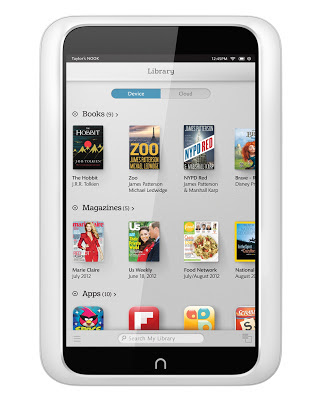The Nook HD is a cheap 7in tablet with a stunning HD screen. We take a closer look to
find out how it stacks up against its rivals, including the Kindle Fire HD and Nexus 7.
Barnes & Noble is an established chain of bookstores in the US. Its 7in Nook
HD weighs about the same as an iPad mini, and is comfortable to hold in one
hand. It’s available in white or grey, and with 8- or 16GB of storage. A microSD
card slot lets you boost this capacity.
The Nook HD is has its sights set on the Amazon Kindle Fire HD, and Barnes
& Noble is quick to point out that you won’t get bombarded by adverts on the
lock screen and that there’s a mains charger in the box.
It’s also thinner and lighter than the Fire HD, but it's the screen that's the
star of the show. This IPS display has 1440x900 pixels, giving it a pixel density of
243ppi – almost as high as the Retina iPad. In fact, it’s hard to tell the difference
in terms of clarity, and the colours and contrast of the Nook HD’s screen are
excellent, as are viewing angles.
One annoyance is the proprietary dock connector, which means you'll have to
carry the charger around with you. An HDMI adaptor cable is said to be in the
works, but we prefer Amazon's industry-standard micro USB and HDMI ports.
It's also a shame there's no camera for Skype, but this is a device purely for
content consumption, and Barnes & Noble makes no bones about that.
Like the Fire HD, the Nook HD runs Android Ice Cream Sandwich. It’s so
heavily customised that it’s unrecognisable as Android, save for a few clues such
as the volume slider. Press the power button on the left side and you immediately
find a feature we’ve been waiting a long time for on a tablet: user profiles.
You can create up to six profiles, and you drag an avatar on to the
padlock to load that profile. Naturally, you can assign passwords so your
kids (or your other half) can’t access your stuff. You can choose which
apps and features are available to each person.
Backgrounds can also be personalised for each user, and things like
bookmarks and notes are user-specific, even though several family
members could be reading the same content. You can even have
separate email accounts – there's support for Microsoft Exchange, too,
which means you can access work email if your firm uses Exchange.
The main menu is similar to Amazon’s, with a carousel of recently
used apps, books and magazines, but not web pages. Below this is
space for a few shortcuts to apps, books, videos and magazines.
Content
The book selection is vast, although there are holes – no Gruffalo for
kids, nor any Jamie Oliver cookbooks, for example. Things are less
impressive when it comes to magazines and newspapers, with few UK
titles on offer. At the time of writing the film store had yet to launch.
When it comes to apps, your only option is the Nook store,
which has a limited selection of popular titles, but they are at least
curated. There's Angry Birds Star Wars and Words With Friends, but
no BBC iPlayer or Lovefilm. There is Netflix, which is a consolation
if you have a subscription to that service.
A Flash app has been added to the Nook store, which you'll have to install
to watch Flash videos or use Flash-based websites.
The system is locked down so tightly it makes the Kindle Fire HD look like
an open platform. You can't install any app that's not in the Nook store, so it
isn't possible to side-load the Amazon
Appstore or Google Play.
Music fans are out of luck as there's no
music store, but the built-in Music Player will
play your MP3s, while the Gallery app can
show your photos.
Books and magazines from the Nook store
look amazing, with high-resolution images that
look lifelike on the HD screen. Page turns in
magazines are slick 3D affairs, while in books,
you simply swipe to instantly slide to the next
page. With kids' books, you can double-tap
to enlarge the text panel on each page to
make it more readable, and it's possible to record your voice so they can listen
to someone read aloud the book.
Performance
The dual-core 1.3GHz processor is a slightly slower version than the one used
in Archos' 101 XS, but the Nook HD is still a powerhouse. It completed the
SunSpider JavaScript test in 1,248ms and web browsing is a speedy affair.
The Nook HD managed 1,199 in Geekbench 2, which is a reasonable result
and higher than that of the Kindle Fire HD (which scored 1,124), but lower than
the Nexus 7 (1,452). In our graphics benchmark, GLBenchmark 2.5.1, the Nook
HD produced 14fps. Not a bad result but, again, slightly behind the competition.
Subjectively, the Nook HD is fast. It loads apps and web pages quickly, rarely
leaves you waiting and the interface never feels jerky. Plus, in casual games such
as Angry Birds Star Wars, the framerate is very smooth.
The high screen brightness immediately puts the Nook HD at a disadvantage
compared to dimmer tablets, and it lasted 5 hours and 25 minutes with maximum
brightness in our video-looping test. If you drop the brightness to a more sensible
level you could get an extra couple of hours.
Source.Tablet World UK.Edition.3.2013
